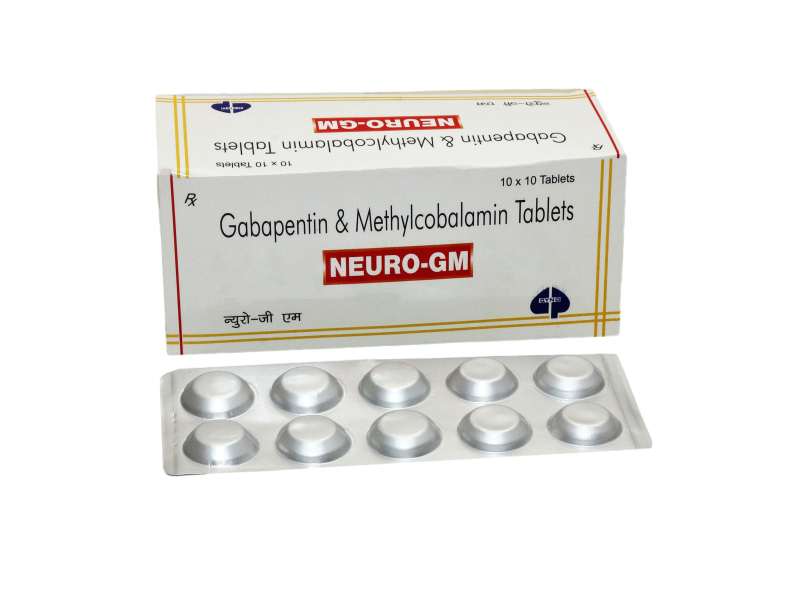NEURO GM
Gabapentin (300 mg), Methylcobalamin (500 mcg)
Gabapentin is a GABA analog. It was originally developed to treat epilepsy, and currently, gabapentin is widely used to relieve pain, specifically neuropathic pain. It is the first-line drug for the treatment of diabetic neuropathy, postnatal neurological pain, and neuropathic pain caused by central pain. Gabapentin treats seizures by reducing abnormal stimulation in the brain. Gabapentin relieves the pain of PHN by changing the way the body aches.
Methylcobalamin is used to treat vitamin B12 deficiency. Vitamin B12 is important for the brain and nerves and the production of red blood cells. Methylcobalamin is sometimes used in people with fatal anemia, diabetes, and other conditions (Alzheimer’s disease and rheumatism). Methylcobalamin has octahedral cobalt (III) center and can be obtained as bright red crystals.

Mechanism of Action:
Gabapentin inhibits the central L-type calcium channels situated on the axon terminal and reduces the hyperactivated neurotransmitter release. Gabapentin relieves the severe pain associated with neuropathy.
Methylcobalamin is the neurologically active form of vitamin B12, which increases Myelin sheath formation and regenerates neurons.
Indications:
1. Peripheral neuropathy
2. Trigeminal neuralgia
3. Diabetic neuropathy
Pharmacokinetic Properties:
Gabapentin is structurally related to the neurotransmitter GABA but is neither a GABA agonist nor antagonist. Gabapentin-binding sites have been identified throughout the brain tissues e.g. neocortex and hippocampus. However, the exact mechanism of action is still unknown.
Absorption: 50-60% absorbed (oral); peak plasma concentrations after 2 hours.
Distribution: Widely distributed; enters breast milk. Protein-binding: Minimal.
Metabolism: Poor.
Excretion: Urine and feces; 5-7 hr (elimination half-life).
Drug-Drug interactions:
Cimetidine may reduce gabapentin clearance. Absorption reduced with antacids.
Precautions:
Gabapentin should not be discontinued abruptly after long-term use. Abrupt or over-rapid withdrawal may provoke a withdrawal syndrome similar to alcohol or benzodiazepine withdrawal. Gradual reduction over weeks or months helps minimize or prevents the withdrawal syndrome. Discontinuation or transfer from other antiepileptics, history of psychotic illness; renal impairment; pregnancy. Gradual withdrawal over at least 7 days to prevent an increase in seizure frequency.
Fertility:
There is no effect on fertility in animal studies.
Dosage:
Strictly follow all instructions provided to you by your physician or pharmacist while using Neuro-GM (Methylcobalamin/Gabapentin). Optimum and safe dosage can differ based on the patient and the condition being treated.
Duration of action:
The exact mechanism of action is still unknown. Absorption: 50-60% absorbed (oral); peak plasma concentrations after 2 hr.
Adverse Reaction:
The most commonly reported adverse effects associated with gabapentin are somnolence, dizziness, ataxia, and fatigue. Nystagmus, tremor, diplopia, amblyopia, pharyngitis, weakness, arthralgia, paraesthesia, purpura, leucopenia anxiety, and UTI may occur less frequently.
Rarely pancreatitis, altered liver function tests, rhinitis, nervousness, myalgia, headache, nausea, and vomiting have been reported.
Methylcobalamin has no side effects or toxic effects even at a high dose for the long term.
Storage:
Store at 25°C (77°F); excursions permitted to 15° – 30°C (59° – 86°F).
Overdosage:
Acute, life-threatening toxicity has not been observed with Gabapentin. Overdoses of up to 49 grams are ingested at one time. In these cases, dizziness, double vision, slurred speech, drowsiness, lethargy, and mild diarrhea were observed. All patients recovered with supportive care.
Gabapentin can be removed by hemodialysis. Although hemodialysis has not been performed in the few overdose cases reported, it may be indicated by the patient’s clinical state or in patients with significant renal impairment.
Methylcobalamin for clinical effectiveness is 0.5-6 mg/day and no significant therapeutic advantage is observed beyond this range.
Contraindictions:
Gabapentin is contraindicated in patients who have demonstrated hypersensitivity to the drug or its ingredients.
Side Effects of Gabapentin:
Somnolence, dizziness, ataxia, weakness, paraesthesia, fatigue, headache; nystagmus, diplopia; nausea, vomiting, weight gain, dyspepsia; rhinitis; tremor; leucopenia; altered LFTs; Stevens-Johnson syndrome.
Warnings:
This medicine may interact with many other medicines and may cause severe adverse effects. Hence, it is advised that you inform the doctor about all your current medicines including any herbs and supplements before beginning treatment with this medicine.
Pregnancy:
Contraindicated.
Breast Feeding:
Contraindicated.
Children:
Use with caution
